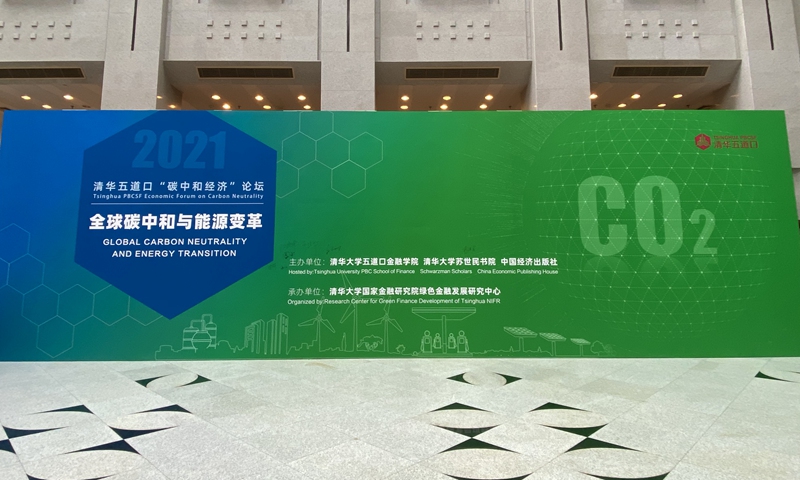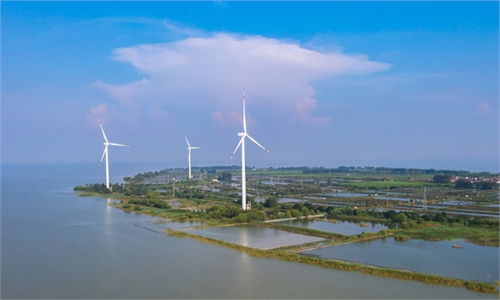
Hosted by Tsinghua University PBC School of Finance, Schwarzman Scholars, and China Economic Publishing House, the Tsinghua PBCSF Economic Forum on Carbon Neutrality is held in Beijing on Thursday and invites former government officials, academics and Chinese energy giants. Photo: Zhang Dan/GT
China's efforts to reach carbon peak by 2030 and carbon neutrality by 2060 might require an investment of up 300 trillion yuan ($46.6 trillion), a prominent Chinese economist said on Thursday, noting that pursuing the goals will not come at the costs of economic growth and people's livelihood.
Realizing coordinated, sustainable and high-quality development in combination with a carbon emission reduction push is key, Zhang Xiaohui, dean of the Tsinghua University PBC School of Finance, said at the Tsinghua PBCSF Economic Forum on Carbon Neutrality in Beijing.
"As a result, China should follow its own pace when pushing for the carbon peak and carbon neutrality goals, strive to balance the economic development and carbon emission reduction, avoid and resolve risks during the transition and achieve an orderly, fair and green transition," Zhang said, noting green finance will play an essential role in achieving those goals.
Based on estimates by multiple institutions, Zhang said that China's net-zero strategy would require investment of up to $46.6 trillion, or up to 7.5 trillion yuan each year until 2060, equivalent to around 10 percent of annual investments made in the country.
Citing historical experiences and statistics, she said that green finance would likely contribute 90 percent of the investment, while government financial support would only account for 10 percent.
There have been questions raised about to what extent China would sacrifice its economic growth to reach its ambitious carbon neutrality goals after the country's pledges were made public.
Ju Jiandong, Unigroup Chair Professor at the PBC School of Finance at Tsinghua University, said that China's GDP growth will not take a big hit before reaching carbon peak by 2030.
"If we do not take administrative means but economic measures [to reach the goals], the impact on China's annual GDP growth will be lower than 1 percent [before reaching carbon neutrality]," he told the Global Times at the forum.
Still, Ju said that given China's status as a developing country, the goals are very significant and deserve "encouragement" from other countries instead of criticism and disruption.
The US, which also set ambitious goals to combat climate change, still imposed hefty anti-dumping and anti-subsidy duties on China-produced solar panels.
"When some developed countries asked China to make enormous contributions, we hope at least they don't seek economic aggression at the same time," Ju said, urging the US to not pursue confrontation with China in tackling climate change.
At the forum, Ma Yongsheng, general manager of Sinopec, said that China's oil consumption is expected to reach its peak at around 2026. That will give natural gas a bigger role and send it to top China's biggest fossil energy at around 2050, according to Ma.


